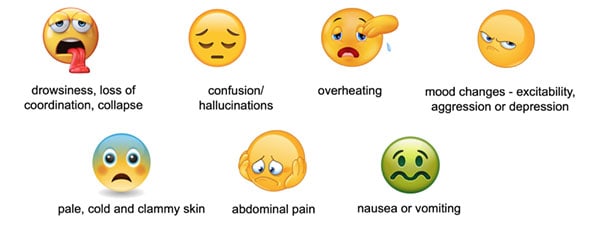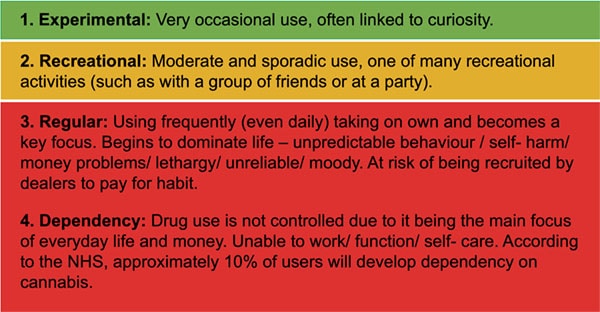Peer pressure
It’s not always easy to stand up to those who seem cool and you don’t want to feel left out. These tips can help:
- If you’re uncomfortable, avoid the situation (a spot such as a park where dealing is taking place, or a party where you know there will lots of stuff).
- Change your friendship group – real friends don’t try to get you into drugs!
- Fudging – means having an excuse ready – such as:
- Just need to take this call back in a mo.
- I’m on medication.
- Got a big game tomorrow – got to stay clear headed.
- Don’t need it mate, having a great time already.
- Can’t afford the habit (beware them offering some for free to lure you in).
- I’m allergic – makes me psycho, no way mate.
- or just say no thanks – look them straight in the eye, be straight forward and use banter.
Tips to stay safer around drugs
Think about the drug
- Find out if the substance is mixed with other drugs, including alcohol or medication?
- Find out how pure or strong the drug is; are other substances mixed with it? How can you know?
- How will the drug be taken? – swallowed, smoked, injected? This can change the amount of time it takes for a substance to take effect and the length of time it lasts.
- Start low, go slow – users can reduce – though not eliminate risks – by taking a small amount, giving it plenty of time to have its effect, before deciding whether to go ahead with any more. No-one should rely on other peoples’ experiences with drugs – although they might look the same, they might not be. Also, people react differently to the same thing.
- Don’t mix – mixing substances changes the effect and changes the risk. Some substances mix more riskily than others and things could get very dangerous if someone mixes with alcohol or prescription drugs.
Think about the user – how they are when they are thinking about taking drugs
- If anyone is planning to take substances of any sort they need a trustworthy, clear-headed, sensible friend to look out for them. If you’re that friend, stay together – you are the best harm reduction your mate has, so stick with them.
- Their state at the time – dehydrated, haven’t eaten, taken other drugs or alcohol?
- Any medical conditions?
- How are they feeling at the time (excited, anxious, hyper, depressed, angry)?
- Have they taken drugs before?
Think about the place
- Who are they with? Risky situation? Vulnerable to others?
- What is the place they are in like? Hot, cold, crowded, isolated, clean?
- What are the people around them like? Will they look out for them? Vulnerable to grooming, violence or exploitation?
- Are they at risk of having an accident, or of putting themselves at risk of other harms?
Check in with them regularly
Look for physical signs, and get them to tell you if they’re not feeling right. They might look OK, but actually be starting to feel unwell or strange.
- How are they physically?
- Any ill health or allergic reactions?
Remember the law! Legal consequences can stay with you for life. See this information on drugs, alcohol and the law.
Don’t be afraid to call 999
Make sure that you understand about the issue of consent. If someone is under the influence of drugs, legally, they might not be able to give consent. See also our advice on festivals and travel.
When to call for help
Never worry about getting help if things start to go wrong for someone – don’t think you’ll get in trouble, or get that friend into trouble. This is not likely to happen, and you could literally save their life by calling an ambulance or getting them professional help.
If these things are happening to someone you’re with, keep a very close eye, and keep checking in with them:
If any of these things happen, call 999 immediately:
Am I getting addicted? – How do people know if a problem is developing
The different steps which can lead to addiction:
Read next Where to go for help and support



